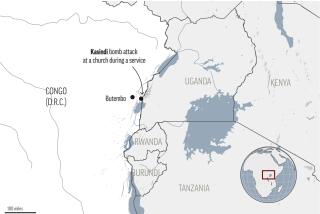Blast kills at least 9 gathered to hear cleric in south Iran
- Share via
TEHRAN — A bomb blast tore through a Shiite Muslim house of worship in a southern Iranian city Saturday night, killing at least nine people and injuring more than 100 others, most of them gathered to hear a religious speech about the dangers of Sunni extremists, a semiofficial Iranian news agency reported.
The explosion in the ancient city of Shiraz shattered shop windows and damaged buildings a mile away. Ambulances and firefighters rushed to rescue the wounded, who flooded city hospitals. Officials set up a hotline for relatives to find out about casualties.
“We are trying to inform the people about the names of the wounded victims of the blast incident through cooperation with the medical centers where they are hospitalized,” Ebrahim Azizi, the governor-general of Shiraz, told reporters, according to the Islamic Republic News Agency.
No one had claimed responsibility for the attack, and Iranian authorities told news agencies that the blast remained under investigation. Azizi said the blast was not caused by a bomb, contradicting other local officials, but did not offer an alternative cause.
The explosion occurred at a hosseinyeh, a Shiite house of worship similar to a mosque but often used for community and religious activities.
The Fars news agency reported that a mid-ranking cleric was delivering a speech about the “misleading and corrupted cults” of the Wahhabi Islamic school that inspires Osama bin Laden as well as the Bahai faith when the blast went off. The cleric was slightly injured, Fars reported. Other news services gave his name as Hojatoleslam Anjavinejad.
Shiraz is an old southern city that once hosted famous Persian poets. It is also the namesake of the famous wine grape. In recent weeks, the city has experienced student unrest. Videotapes posted on the YouTube file-sharing website show hundreds of student activists chanting slogans against government policies.
Few ethnic and religious minorities live in the city itself. But southwestern Iran, abutting Iraq, is home to Sunni and Shiite Arabs who have occasionally rebelled against the rule of the Islamic Republic, which holds Shiite Islam as the official state religion and is dominated by ethnic Persians and Azeris.
Southeastern Iran has been the scene of a low-level insurgency waged by ethnic Baluchi Sunnis, who have killed dozens of Iranian security officials over the last two years. In February, Iranian authorities rounded up dozens of people suspected in one such attack.
In addition, suspected Iranian Arab separatists set off nearly a dozen bombs in southwestern Iran from 2005 to 2006, killing at least 26 people and injuring more than 200.
Iran alleges that the U.S., Israel and Britain are behind the upsurge in militant activity and says it has intelligence to support its allegations.
“There are numerous ethnic and/or religious minority groups within Iran and in neighboring countries with grievances against Iran’s fundamentalist clergy,” said Karim Sadjadpour, an Iran expert at the Carnegie Endowment for International Peace in Washington. “Whomever the true culprits, the authorities in Tehran will likely claim that they were acting in concert with the United States and Israel.”
The explosion comes amid rising tensions between the U.S. and Iran over Tehran’s nuclear program and its alleged support for militant groups in Iraq, Lebanon and the Palestinian territories.
On Saturday, Iranian officials rejected reports of a confrontation two days earlier between a U.S. Navy warship and an Iranian military speedboat in the Persian Gulf. CNN, citing anonymous U.S. officials, had reported Friday that the Typhoon warship fired a flare to warn off an approaching Iranian boat after its radio warnings were not heeded.
In an interview with ABC on Friday, President Bush sternly warned Iran not to meddle in Iraq. “The message to the Iranians is: We will bring you to justice if you continue to try to infiltrate, send your agents or send surrogates to bring harm to our troops and/or the Iraqi citizens,” he said.
Tehran has denied U.S. allegations of supporting Shiite militias in Iraq.
--
--
Times special correspondent Mostaghim reported from Tehran and staff writer Daragahi from Beirut.
More to Read
Sign up for Essential California
The most important California stories and recommendations in your inbox every morning.
You may occasionally receive promotional content from the Los Angeles Times.












